Top Tips for Using Free Trials on Background Checks
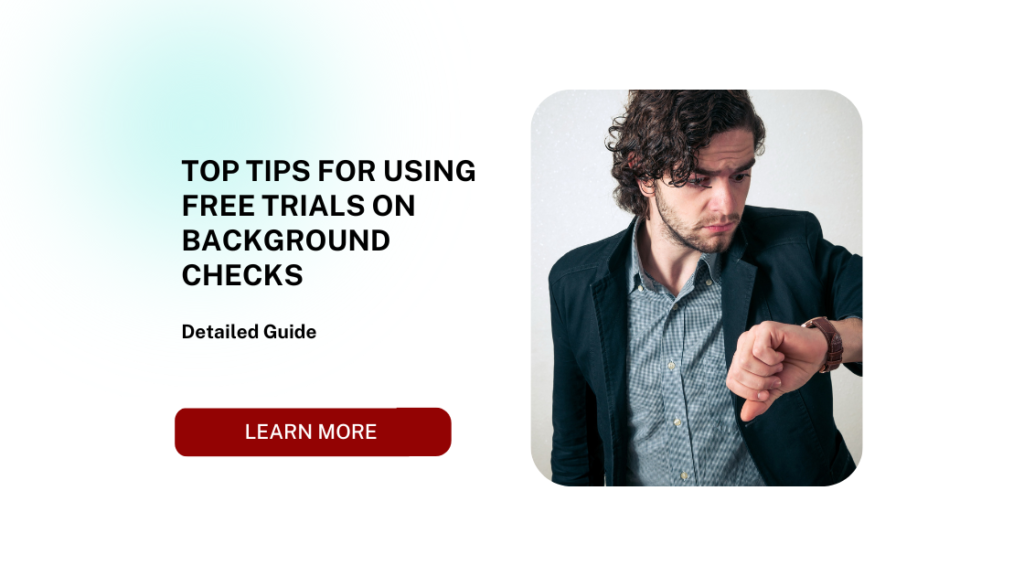
Understanding Criminal Background Check Free Trials
Criminal background checks play a crucial role in verifying an individual’s history, whether for employment, housing, or other purposes. With many companies offering free trials for these services, understanding the benefits, limitations, and proper use of such trials is essential. In this section, we’ll explore the basics of criminal background checks, the purpose of free trials, and how they can benefit users seeking reliable information.
What Is a Criminal Background Check?
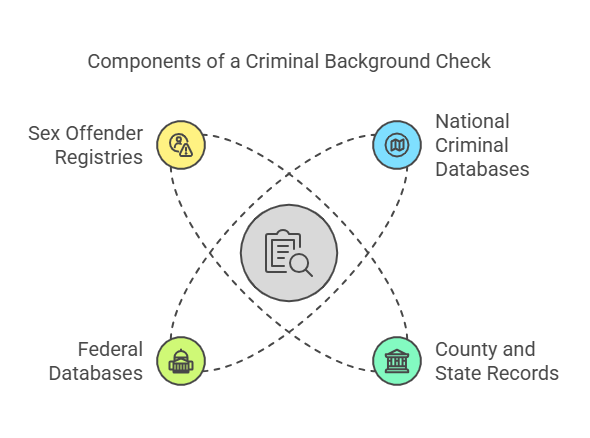
A criminal background check examines an individual’s past to identify any records related to legal issues, including arrests, convictions, warrants, and incarcerations. These checks pull data from various sources, such as:
- National Criminal Databases: Compiling records from across the country.
- County and State Records: Providing detailed local information.
- Federal Databases: Covering crimes prosecuted at the federal level.
- Sex Offender Registries: Highlighting any registrations.
Uses of Criminal Background Checks:
Criminal background checks serve numerous purposes, such as:
- Employment Screening: Ensuring candidates meet organizational standards.
- Housing Applications: Helping landlords assess tenant reliability.
- Volunteer Positions: Verifying the suitability of individuals working with vulnerable populations.
- Personal Use: Allowing individuals to review their own records for accuracy.
What Are Criminal Background Check Free Trials?
Free trials allow users to test a background check service without committing to a paid plan. They are commonly offered by online platforms specializing in background screenings and aim to provide users with a firsthand experience of the platform’s features and reliability.
Key Features of Free Trials:
- Access to Limited Services: Basic criminal background checks or specific search capabilities.
- Trial Periods: Typically ranging from 7 to 30 days.
- No Obligation: Users can cancel without incurring charges after the trial period ends.
Why Companies Offer Free Trials:
- To attract potential customers by showcasing the platform’s capabilities.
- To build trust and establish a reputation for reliability.
- To allow users to assess the ease of use, accuracy, and comprehensiveness of the service.
How Criminal Background Check Free Trials Work
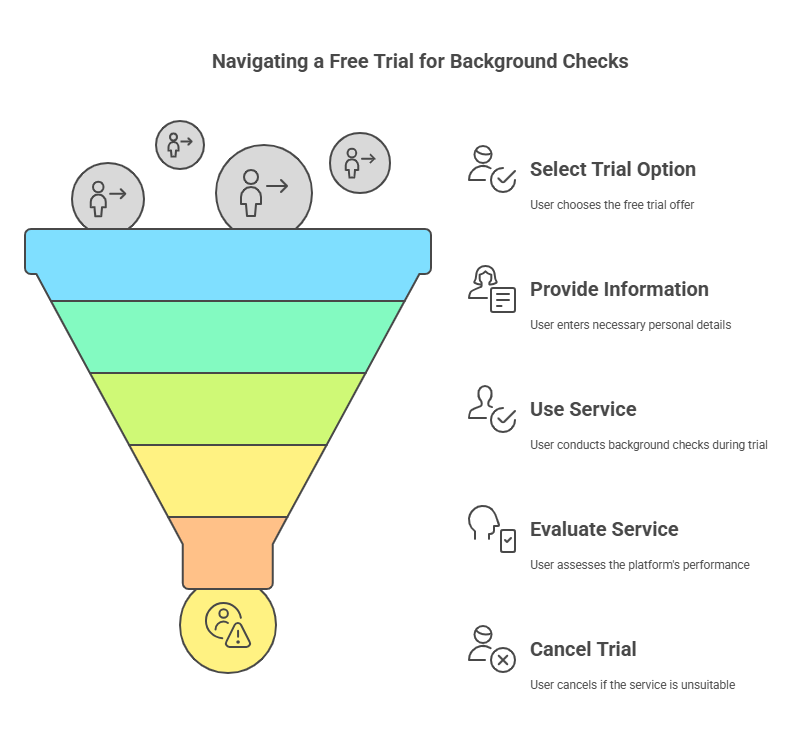
Using a free trial involves a straightforward process:
- Sign Up: Create an account on the provider’s platform.
- Select the Free Trial Option: Many companies prominently display their free trial offerings during registration.
- Provide Basic Information: This may include your name, email, and payment details (if required).
- Use the Service: Conduct criminal background checks during the trial period to evaluate the platform’s performance.
- Cancel if Unnecessary: If you decide the service isn’t suitable, cancel before the trial ends to avoid charges.
Benefits of Criminal Background Check Free Trials
Free trials are an excellent way for individuals and businesses to:
- Test Accuracy: Evaluate whether the service provides reliable and up-to-date information.
- Assess User Experience: Determine if the platform is easy to navigate.
- Compare Providers: Experiment with multiple platforms to find the best fit.
- Save Money: Perform essential checks without upfront costs.
Limitations to Keep in Mind
While free trials offer many advantages, they may also have limitations:
- Restricted Features: Some providers limit access to advanced search options or detailed reports during the trial.
- Trial Periods: The timeframe may not be sufficient for thorough evaluations.
- Automatic Charges: Failing to cancel before the trial ends may result in subscription fees.
Table: Pros and Cons of Criminal Background Check Free Trials
| Pros | Cons |
|---|---|
| Cost-effective way to test a service | May require payment details upfront |
| Provides insights into platform functionality | Limited access to premium features |
| Builds trust in the provider’s reliability | Trial periods may be too short |
| Allows users to compare multiple services | Automatic charges if not canceled in time |
How to Use Criminal Background Check Free Trials Effectively and Maximize Their Benefits
Criminal background check free trials are a cost-effective way to evaluate a platform’s features, accuracy, and reliability before committing to a paid plan. While free trials are highly valuable, making the most of them requires careful planning and an understanding of their scope. In this section, we’ll explore the process of using free trials effectively, discuss who benefits most from these services, and share actionable tips to maximize their advantages.
Step-by-Step Guide to Using a Criminal Background Check Free Trial
Free trials are designed to give users a firsthand experience of a platform’s capabilities. However, understanding how to navigate the process is essential for maximizing value.
1. Research and Select a Reputable Service Provider
The first step to successfully utilizing a free trial is choosing the right platform. With numerous services available, selecting a provider that aligns with your specific needs is crucial.
Key Factors to Consider:
- Reputation: Look for reviews, testimonials, and ratings to assess the provider’s credibility.
- Compliance: Ensure the service adheres to the Fair Credit Reporting Act (FCRA) or other applicable laws to guarantee accurate and lawful reporting.
- Features: Identify whether the platform includes essential features, such as national criminal database searches, county-level checks, and access to sex offender registries.
Recommended Research Strategies:
- Use review platforms like Trustpilot or Better Business Bureau.
- Compare multiple services to identify the one that offers the most value during the free trial.
- Check if the service has any restrictions during the trial, such as a limited number of background checks.
2. Sign Up for the Free Trial
After selecting a provider, the next step is registration. Most platforms have a straightforward sign-up process, but some require payment details upfront.
Steps to Sign Up Successfully:
- Create an Account: Provide basic personal details, such as your name and email address.
- Choose the Free Trial Plan: Carefully read the terms and conditions to understand the trial duration and available features.
- Input Payment Information (If Required): Many services require credit card details to activate the trial, even if they don’t charge you immediately.
- Confirm Registration: Check your email for a confirmation link to activate the account.
3. Use the Platform to Perform Background Checks
Once registered, you can begin using the service. Here’s how to make the most of the trial period:
Focus on Critical Features:
- Conduct searches on criminal records, including arrests, convictions, and warrants.
- Test additional capabilities, such as employment verification or educational history.
- Explore local and national database searches to ensure comprehensive results.
Conduct Multiple Tests:
If the trial permits, use the platform to check different individuals or scenarios. This will help you determine the service’s consistency and accuracy across varied cases.
Save Results for Reference:
Download or print the reports generated during the trial for future reference. This is especially useful for businesses comparing multiple providers.
4. Assess the Platform’s Performance
Before deciding whether to continue with a paid subscription, evaluate the service’s performance in the following areas:
Key Evaluation Criteria:
- Accuracy: Are the results comprehensive and error-free?
- Speed: How quickly does the platform deliver reports?
- Ease of Use: Is the platform user-friendly and intuitive?
- Support: Does the provider offer customer service to address queries or issues during the trial?
5. Decide Whether to Transition or Cancel
Before the trial expires, decide whether to transition to a paid plan or cancel the trial. Failing to cancel on time may result in unwanted charges.
Steps to Cancel:
- Log in to your account and navigate to the subscription settings.
- Follow the instructions to cancel the trial.
- Confirm cancellation and check your email for confirmation.
Who Benefits the Most from Free Trials of Criminal Background Checks?
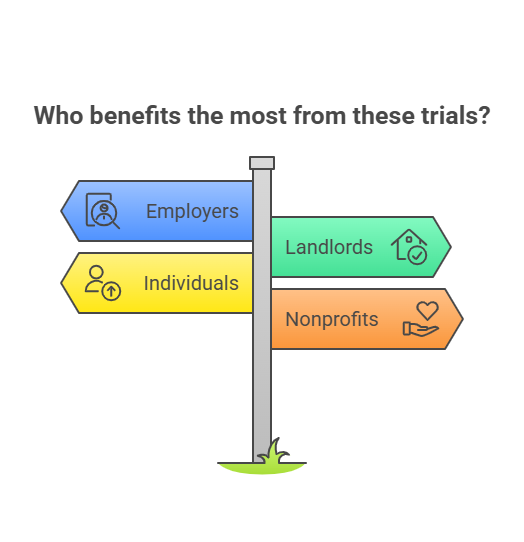
Free trials cater to a wide range of users, each with unique needs. Understanding how these groups benefit can help tailor your approach during the trial period.
1. Employers and Hiring Managers
Hiring managers use criminal background checks to make informed decisions about job candidates. Free trials help employers:
- Test Reliability: Evaluate the service’s ability to provide accurate and comprehensive reports.
- Save Costs: Perform initial screenings without financial commitment.
- Ensure Compliance: Verify that the service meets industry and legal standards for employment screening.
2. Landlords and Property Managers
Tenant screening is a critical step for landlords. Free trials enable them to:
- Screen Tenants Quickly: Access criminal records to identify red flags.
- Compare Services: Experiment with different platforms to find the best fit.
- Ensure Safety: Protect other tenants and properties by selecting trustworthy renters.
3. Individuals Reviewing Their Records
Free trials also benefit individuals who want to check their own criminal records. This can help them:
- Identify inaccuracies or outdated information in their background.
- Prepare for job interviews or rental applications.
- Gain peace of mind about their criminal history.
4. Nonprofits and Volunteer Organizations
Organizations working with vulnerable populations, such as children or the elderly, can use free trials to:
- Screen potential volunteers effectively.
- Test the platform’s features without straining their budget.
- Ensure the safety of the people they serve.
Tips to Maximize the Benefits of a Free Trial
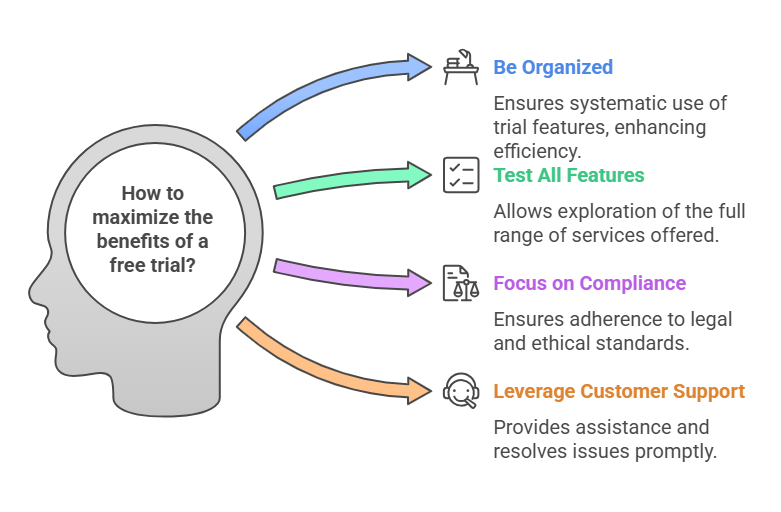
To get the most out of a free trial, consider these actionable tips:
1. Be Organized
- Create a list of individuals or scenarios you want to test during the trial.
- Set reminders to track the trial period and cancellation deadline.
2. Test All Features
Even if you’re primarily interested in criminal records, explore other features like employment verification or educational checks.
3. Focus on Compliance
Choose a provider that complies with legal standards, such as the FCRA, to avoid issues with inaccurate or unlawful reporting.
4. Leverage Customer Support
Many services offer live chat or email support during the trial period. Use this to ask questions or resolve issues quickly.
5. Compare Providers
If possible, sign up for trials with multiple services to compare their offerings, accuracy, and overall value.
Advantages of Free Trials
- Risk-Free Evaluation: Test a platform without financial commitment.
- Cost Savings: Conduct essential checks at no cost.
- Informed Decisions: Use the trial period to assess which service best meets your needs.
- Improved Compliance: Verify the service’s adherence to legal requirements.



